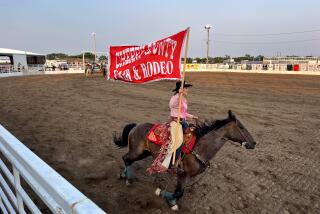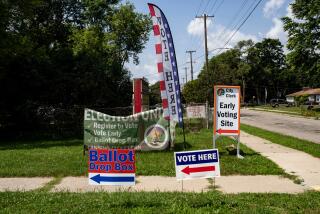Small Places Looming Large in Bush’s Reelection Strategy
- Share via
CUBA CITY, Wis. — Exactly one week before election day, President Bush spent much of Tuesday afternoon amid a driving rain vigorously stumping for support from the residents of this picturesque southwestern Wisconsin town.
All 2,047 of them.
Towns the size of Cuba City don’t expect to see presidential candidates this close to the finish line. But small places loom large in Bush’s strategy for winning a second term.
Overall, small-town America has become a pillar of Bush’s strength.
But in the Upper Midwest, rural communities remain more contested ground. And that means one of the key remaining questions in this on-the-edge campaign is whether Bush can match his strength in rural areas elsewhere in the rolling countryside of the three neighboring states at the top of his target list: Iowa, Minnesota and especially Wisconsin.
“Right now, we’re seeing a fight to parity in a [rural] region Republicans would expect to lead,” said Lawrence R. Jacobs, director of the 2004 Elections Project at the University of Minnesota’s Humphrey Institute for Public Affairs.
The stakes in this competition could hardly be higher. In 2000, Bush narrowly lost Iowa, Wisconsin and Minnesota to Al Gore.
This year, the three states, with a combined 27 electoral college votes, probably represent Bush’s best opportunity to offset possible losses in Ohio or even Florida. And his campaign sees improving on his performance in rural areas as key to capturing these states -- especially Iowa and Wisconsin.
Rural communities “are definitely the backbone of the president’s support in many of these states that are critical to the election, and he is going to pay attention to it right up until the end,” said Dan Bartlett, White House communications director.
Bush’s bus trip Tuesday from La Crosse, Wis., through Dubuque, Iowa, was his second along that route this year. His appearance in Cuba City came after he sped through the town on his first bus trip in May without stopping -- which prompted Kerry to visit last summer.
“It’s an important area,” said Terry Nelson, the Bush campaign’s political director. “You change around that region and you can win both of those states.”
Kerry also has been competing aggressively for rural votes in general -- and support in this corner of southwestern Wisconsin in particular. John Edwards, the Democratic vice presidential nominee, has spent about 40% of his time campaigning in rural areas, said Kim Rubey, his communications director.
Kerry prepared for his first debate with Bush near here in Spring Green. Earlier this year, he went trap shooting near La Crosse with the local Democratic representative, Ron Kind. And this week, Kerry announced that if elected, he would convene “a national rural summit” in Ames, Iowa, within the first 100 days of his presidency.
“We have forced the Bush campaign to spend a lot of defense and a significant amount of time and resources in areas that should have been firmly in their corner,” said Rubey.
The shifting allegiance of rural America toward the GOP was probably the single most dramatic change in the electorate from 1996, when President Clinton won reelection handily, to 2000, when Bush narrowly defeated Gore.
In 1996, Voter Network Service exit polls showed that Clinton lost to Republican Bob Dole among rural and small-town voters by 2 percentage points -- although that was partly because Ross Perot siphoned away about 1 in 10 of those voters.
But in the wake of the Clinton-Monica Lewinsky scandal, the Democratic vote in small-town America collapsed in the 1998 congressional races -- with Republicans amassing a resounding 24-percentage-point margin.
In 2000, Bush almost exactly replicated that margin, crushing Gore with rural voters by 22 percentage points.
Rural America is providing Bush important support again this year. In a Los Angeles Times Poll released this week, Bush drew nearly three-fifths of the vote from rural and small-town residents; recent CBS/New York Times, CNN/USA Today/Gallup and Pew Research Center surveys have found similar results.
Bush’s commanding position in rural Missouri helped him to move the state out of competition virtually without a fight from Kerry. And his continuing strength in southern Ohio represents his best chance to hold the state amid job losses that have weakened him in northern Ohio: The most recent Ohio Poll gave Bush a 17-percentage-point lead in rural communities.
Strength in rural communities likewise remains central to Bush’s more distant hopes of snatching Michigan and Pennsylvania from Kerry. “If we can’t maximize the vote in our rural areas in a state like Pennsylvania, that’s not going to end up being a state that we can win,” said Nelson.
In all, even some senior Kerry advisors acknowledge that Bush’s position in rural America remains formidable. “The contours are still in place,” said Stanley B. Greenberg, a Democratic pollster advising Kerry. “There has not been very much erosion of Bush’s support.”
Just as in rural communities elsewhere, Bush in 2000 significantly improved on Dole’s showing in the Upper Midwest. But even with those gains, Bush only ran about even with Gore in the 20 most rural counties in Wisconsin and Minnesota, a Times analysis found. Gore won several of the rural counties that Bush visited Tuesday.
The latest public polls generally show Bush narrowly leading in Iowa, and Kerry narrowly leading in Minnesota, with the two men running about even in Wisconsin. When the University of Michigan recently surveyed Iowa and Wisconsin, it found Kerry and Bush running about even among rural voters in both states.
In the campaign’s final days, the struggle to tilt that balance is largely a duel between competing forms of populism.
Bush and his allies are relying heavily on cultural issues such as gay marriage, abortion and gun control. The National Rifle Assn. has launched a $20-million pro-Bush campaign targeted largely at rural communities.
“We had a lot of social conservatives who believe in the right to life, who don’t support gay marriage, who weren’t convinced [in 2000] where the president was,” said Steve Freese, a Republican state representative from nearby Dodgeville, Wis. “Now that base is energized more than I’ve ever seen before.”
That enthusiasm was apparent at the Cuba City rally Tuesday. Homemade signs reading “Christians Unite & Pray 4 Bush” and “Pray for Us” dotted the crowded high school gymnasium.
Bush received perhaps his loudest ovation of the day when he touted his opposition to so-called partial-birth abortion.
“I like the spiritual stand he takes, his faith and his pro-life position,” said Linda Goke of nearby Plattville.
But with fewer evangelical Protestants, socially conservative views aren’t quite as fervent or dominant in the Upper Midwest’s rural communities as elsewhere, experts note.
And Democrats traditionally have found an opening in these economically strained communities with populist messages and promises of government activism.
“When I’m talking to people and I’m going door to door, they want to talk about economy and jobs,” said lawmaker Kind, who represents the area. “And very rarely are people on their own raising gun, gods and gays as a major issue in their lives. Yet that is where the Bush campaign wants to direct them all the time. The challenge for Kerry will be to focus on these economic issues and what is affecting them day to day.”
In these rural communities typically supportive of the military, confidence in Bush’s decisions as commander in chief may be a thumb on the scales in his favor.
But even some of his supporters in Cuba City acknowledge that the area remains closely divided.
“I think it’s a flip of the coin,” said Mark Pietzel, a farmer and Bush supporter from nearby Dickeyville who attended the Cuba City rally. “If I had to call 100 of my friends, I bet I would get a 50-50 split.”
*
Times staff writer Kathleen Hennessey contributed to this report.
*
(BEGIN TEXT OF INFOBOX)
The rural vote
In 2000, George W. Bush made significant gains among rural voters compared to Republican Bob Dole in 1996. Bush hopes a strong showing from rural voters will help him capture the following states:
2000
--
Iowa
Bush
Rural counties: 54%
Statewide: 48%
Gore
Rural counties: 43%
Statewide: 49%
--
Minnesota
Bush
Rural counties: 51%
Statewide: 46%
Gore
Rural counties: 43%
Statewide: 48%
--
Wisconsin
Bush
Rural counties: 48%
Statewide: 48%
Gore
Rural counties: 47%
Statewide: 48%
*
1996
Iowa
Clinton
Rural counties: 46%
Statewide: 50%
Dole
Rural counties: 43%
Statewide: 40%
--
Minnesota
Clinton
Rural counties: 47%
Statewide: 51%
Dole
Rural counties: 38%
Statewide: 35%
--
Wisconsin
Clinton
Rural counties: 47%
Statewide: 49%
Dole
Rural counties: 35%
Statewide: 39%
*
Source: U.S. Census Bureau
More to Read
Get the L.A. Times Politics newsletter
Deeply reported insights into legislation, politics and policy from Sacramento, Washington and beyond. In your inbox twice per week.
You may occasionally receive promotional content from the Los Angeles Times.










